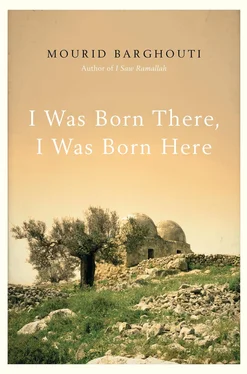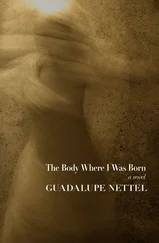The operation was successful but to this day Radwa’s health remains generally delicate and this makes her susceptible to pains that she has learned to bear with a dazzling courage I’m incapable of learning from. If I catch so much as a passing runny nose I get into a panic and fill the world with my complaining and whining, and if my temperature goes up one degree I’m a dead man for sure (a business that deserves to be mocked and is apparently a bane of the male — but who among us can claim to have rid himself completely of the weaknesses of male nature that have come down to us through the generations?).
Did I say I’d fill the world with my complaining at every passing runny nose? Didn’t I say in the paragraph before that I didn’t feel bad or complain? Am I contradicting myself here? Yes! I’m contradicting myself and it amazes me that people are terrified of exposing their contradictions, flying off the handle in dismay at such an ‘ugly’ charge and defending themselves as vehemently as if their honor had been attacked. It doesn’t scare me when someone yells in my face during a discussion, “But you’re contradicting yourself, Mr. Mourid!” I reply “Of course I’m contradicting myself. You’re right. That is indeed a contradiction.” Sometimes I apologize for my contradictions and sometimes I don’t. Humans are full of contradictions however much they deny it. Each of us holds within him contradictory voices to each of which he listens at different times, thus making his inconsistency clear for all to see. Nor do those who yell at me “You’re wrong, Mr. Mourid” scare me. Of course I will sometimes be wrong. What’s so strange about that? Am I so stupid as to always be right?
Radwa will suffer for years from an irritable colon and in Budapest she contracted acute pleural effusion, which is life-threatening. An aged Hungarian doctor, experienced and gentle, gives her treatment and she recovers once more. With her illness and her permanently delicate health, she seems to me to be made of glass that may break at the lightest touch and this terrifies me. Nevertheless, she confronts the challenges in her life with the hardness of a diamond. Throughout Tamim’s childhood, she organized her university, political, social, and cultural calendars so as never to leave the house after seven in the evening. I was well aware that she was under threat not only of possible harm at a time when the two of them were alone but even of being arrested for her political stands. This was what she feared most, and it was impossible for her to predict how best to deal with the consequences should that happen. Phone calls weren’t easy at that time. Letters sent by mail took a month or a little less (e-mail, chat rooms, and Messenger would have been something out of science fiction). In the slightly more distant past, when Radwa went to Amherst in the United States in 1973 to obtain a doctoral degree, we had to wait more than a month before we could set up our first telephone call.
Our (recent) phone calls between Amman and Cairo continued with the aim of ensuring Tamim’s return to Egypt. Meanwhile he occupied my spacious white office that looks out over the garden in Amman and sat down to write his famous poem “They Asked Me, Do You Love Egypt? I Said, I Don’t Know.” The intensity of the campaigns of support for Tamim in Egypt, the Arab world, and the rest of the world amazed me. His professors at Boston University sent letters expressing their dismay to the Egyptian government and a number of Arab writers had already done the same. In Egypt, solidarity with him extended to far wider circles. Thirty-four days after he was deported, we received confirmation from Radwa that the efforts had succeeded and that Tamim could return to Egypt, which he did.
How many journeys and how many returns, I ask you, Time? We seem to sink and bob back up with boring regularity. As though the dry land were waves that roll us over every time we take a step.
11. An Ending Leading to the Beginning?
On my last visit but one to Ramallah, I found my friends swapping stories of an incident at the luxurious Darna restaurant. When I asked my friend Ziyad about it he invited me to dinner there so that I could hear the details from its owner. The latter hugged me and said to Ziyad, “Leave him to me for a while.” He took me upstairs, where he asked the waiter to bring him the photos. The waiter did so and my friend started showing them to me one by one. In all of them, the tables, chairs, plates, drawings, and glass of the elegant restaurant were smashed and bullet holes were visible in its columns, walls, ceiling, stairs, door, and floor. He told me the story in detail: “A number of armed fighters belonging to Fatah had become so fed up and angry at the widely known corruption of the Authority’s men that they decided to launch an armed attack on the Authority’s headquarters to express their fury. Of course, at the gate to the president’s headquarters at al-Muqata‘a, they came up against their comrades-in-arms of the duty guard, who were no less angry than the attackers but told them, ‘You won’t find the ones you’re looking for here. Go look for them in the most luxurious hotels and restaurants, where they spend each evening.’”
The angry Fatah men turned around with their weapons and made the Darna restaurant their starting point.
They burst into the restaurant through the main door and started shooting at random.
They didn’t intend to kill but to use the bullets as a final scream of protest. They intended to proclaim their fury at the leadership, the exhaustion of their patience, and their despair at all the promises of reform that had gone unrealized down the years. The customers hid themselves under the tables, of course. I saw a photo of one of them reaching up with his hand to the top of the table from underneath in spite of all the bullets so that he could grope for his glass, in which there was still a little beer, and I laughed.
Corruption is reaching a crisis point. The violence of the Occupation is increasing. Fatah is falling apart. Hamas is rising. This proves that the abyss can widen to take two victims at one time when both lose their minds.
The Authority has decided to sit on its throne waiting for the Israeli tank to smile.
The tank doesn’t smile.
The Arab rulers behave as though their countries are in a dilemma that can be resolved only by making concessions to their enemy and thus defusing the danger he represents. It never occurs to them that it is the Zionist project that is in crisis and that today it is caught in a real dilemma, which it doesn’t know how to get out of.
The Palestinian people, on whose disappearance it based all its calculations, haven’t disappeared and are still here, in its singular hell known as ‘the Occupied Homeland.’ In addition, Israel hasn’t won a clear victory in any of its confrontations with the Arabs since 1967. Despite this, the Arab leaders have yet to lose their fear of victory. Indeed, they rejected victory when they clearly achieved it in 2006 in southern Lebanon and claimed defeat, so attached were they to the latter. The ‘peace process,’ on whose pillow they have been sleeping so long, has exploded under all their heads. It’s just not working, chaps! The absurd peace process has killed more Arabs than all of Israel’s wars together. More dangerously than all this, though, it has seduced the Arab leaders into highjacking the meaning of the Palestinian cause itself and transforming it from one of national liberation into an NGO, and from a program of resistance into one of assistance, ignoring in so doing something every citizen knows, which is that the only form of resistance the Israelis will allow the Palestinians is the presentation of bunches of flowers to the soldiers of the Occupation. However, there aren’t enough flowers in Palestine for an army that keeps up its good work with such energy and constant appetite. During the long siege that the government of Israel has imposed on Gaza, tons of Gazan flowers prepared for export to Europe have become free food for sheep and goats, which munch on them with relish on Valentine’s Day. The Israeli army conducts its maneuvers against our bodies, and with live ammunition. Every time, it ‘keeps trying what’s already been tried’ and doesn’t calm down and doesn’t relax and doesn’t solve its security problem. Israel has tried every kind of military assault against the Palestinians. The United States and the governments of Europe have tried every door except the one door that would lead to a real chance of a solution, which is the door of justice.
Читать дальше











